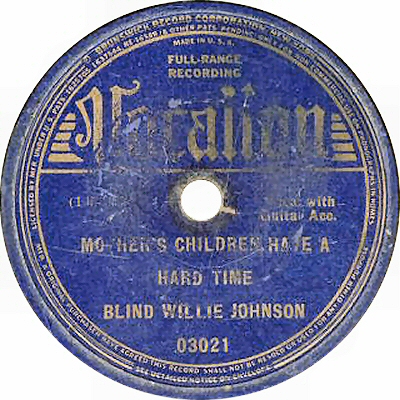While the twenties were a period of economic boom, it was also a period of nervousness for the record companies. Faced with the competition of the raging popular radio, it had to find ways to survive and went on the look for stars to record, a.o. for country blues talents in the South. Some record companies were particular careful in whom to wax as for instance Victor who had Ralph Peer to make a selection of the ones to be invited to the (mobile/local) studios. It was however very difficult to predict what would become a hit, and other record companies started recording whatever they could find. This was the case for instance for Columbia records.
This nervousness also led to quite some clumsiness in the marketing. Blind Willie Johnson’s “Motherless Children” was for instance issued as “Mother’s Children”. Or was it more than just clumsiness, and was it a way to sell the product appealing to the emotions of the public? One can lead to believe the latter as one reads the advertisement showing a high degree of misplaced emotionality (Samual Charters, Country Blues, p. 160) : “A very popular artist sings a wonderful song of mother love. Everyone who loves mother will love this record” (end of quote).
But publicists and critics at the time didn’t bother to check their material, as Abbe Niles wrote in his comment on the record : “…also for connoisseurs, the extraordinary guitarist Blind Willie Johnson, apparently a religious fanatic, singing “Mother’s Children have a hard time” …” (end of quote).
Paramount was not very different. When they started releasing the work of Big Bill Broonzy, quoting his full name, in 1930, they quoted it as “Big Bill Broomsley”.
Carelessness was surely an explanation. I think it was however also an indication of what the record companies found most important : their sales or the respect of the black artists?
You guessed right ! A clear indication of the way they tried to appeal to the public (even white) showed even in the comments of Abbe Niles (a music publicist), when he wrote in 1928 : “Listening to race records is nearly the only way for white people to share the Negroes’ pleasures without bothering the Negro” (sic !) (quoted in Charter’s Country Blues, page 150).


